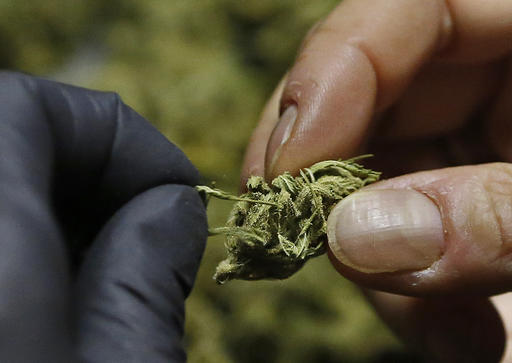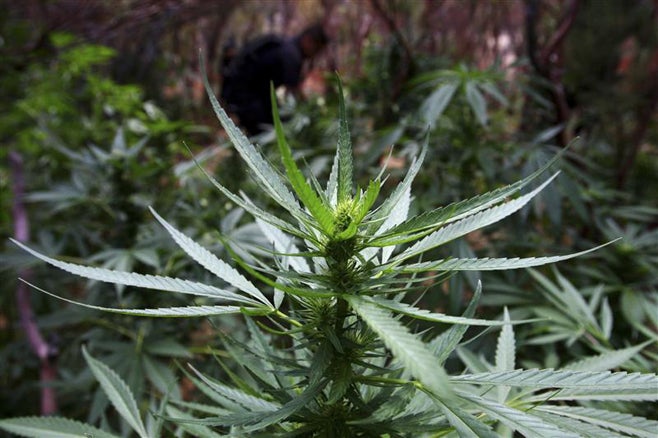Cannabis
stocks listed on the Nasdaq continued to rally after voters ended
prohibition and approved the recreational use of marijuana in
California, Massachusetts, Maine and Nevada.
Ellen Chang
Cannabis stocks listed on the Nasdaq continued to rally on
Wednesday after voters ended prohibition and approved the recreational
use of marijuana in California, Massachusetts, Maine and Nevada while
Arkansas, Florida and North Dakota adopted medical marijuana laws.
Arizona
rejected its measure for recreational use while Montana voters approved
a measure to improve access to medical marijuana providers.
"Whether
they live in blue or red states, voters have spoken in an overwhelming
majority that they want media and recreational marijuana," said Jason
Spatafora, co-founder of Marijuanastocks.com and a Miami-based trader
and investor known as @WolfofWeedST on Twitter. "One election night we
witnessed not just a political shift, but a paradigm shift for cannabis
where prohibition has become untenable."
Interest
in cannabis-related stocks continues to increase from micro cap to
Nasdaq-listed equities and will only continue its upward trend as
investors should be poised for several decades of additional expansion
as more states legalize either recreational or medical use and could
emerge as acquisition targets.
"The
legal cannabis movement scored its most significant victory yet," said
Michael Berger, a former Raymond James energy analyst and founder of
Technical420, a Miami-based company that conducts research on cannabis
stocks. "Although the results of the election will be a turning point
for the legal cannabis industry, we are only in the first inning of what
will be a multi-decade growth cycle.
As legalization measures continue
to go into effect, market sentiment will improve for cannabis stocks and
this should serve as a catalyst for many companies."
The economic impact for these states is immense - California is
estimated to increase to $10 billion market by 2020, while Florida's
medical market should be a $1 billion industry by 2020, he said.
"I
expect the cannabis industry to be a $75 billion dollar industry by
2020," Berger said. "Although many people's estimates are below this, I
take into account more than just the sale legal cannabis because the
ancillary business will benefit significantly."
Several
stocks have been undervalued as investors were skittish and the use of
drugs produced by major cannabis-focused biopharmaceutical companies
have not been widely adopted.
The current options for mainstream
investors in this budding sector are limited to a handful of companies
listed on the Nasdaq, including GW Pharmaceuticals (GWPH) , a U.K.-based biotech company with a cannabis-based epilepsy drug; Insys Therapeutics (INSY)
, a Phoenix company known for its cancer pain management drug but is
developing a cannabis-based drug for the treatment of epilepsy; Cara
Therapeutics (CARA)
, a Shelton, Conn.-based clinical state biopharmaceutical company that
develops and commercializes pain relief drugs and Zynerba
Pharmaceuticals (ZYNE), a Devon, Pa.-based company focused on developing and commercializing synthetic cannabinoid therapeutics.
Being
undervalued means many of these companies such as Cara, Zynerba and GW
Pharmaceuticals are also attractive acquisition targets, said Spatafora.
All three companies are appealing candidates because of their
intellectual property and their pipeline of current and upcoming drugs.
"The intellectual property for GW Pharmaceuticals is based on having
cannabis plant-based drugs rather than synthetic alternatives and in my
estimate is worth $6 billion or roughly $190 per share if bought out,"
he said.
Since
GW Pharmaceuticals is the bellwether company of the cannabis industry
and tends to benefit from positive developments in the sector, the stock
could be poised for headwinds as a result from the increased market
volatility.
"We
continue to view GW Pharmaceutical as the best long-term cannabis
investment due to its deep pipeline of products, its successful FDA
testing results, its Wall Street coverage and its valuation as its
shares are trading well below the average Wall Street price target,"
said Berger. "We continue to view GWPH as a buy opportunity on weakness
from today."
While
there is less research available from analysts, some cannabis stocks
listed on the OTC are also worth consideration, because they will
benefit from the laws that passed in Florida, Nevada and California,
Spatafora said.
Florida's adoption of medical marijuana use could be advantageous for Arcturus Growthstar Technologies (AGSTF)
, which entered into a letter of intent to purchase a Florida farm that
is zoned for cannabis. The state currently has six licensed producers
and expansion will be needed to meet "massive demand," he said.
"They
hedged on the LOI to wait and see if the law passed," Spatafora said.
"The company was pretty wise in this potential acquisition because the
farm already produces $2.6 million in revenue annually."
With Nevada voters approving adult use of cannabis, mCig Inc. (MCIG)
, which used to specialize in lifestyle brands in the vaping and
cannabinoid markets, could benefit. The company founded a construction
division called Scalable Solutions geared toward the Nevada cannabis
cultivation market.
"We
are about to see an explosion of new money come into the state in order
to support the licensed holders and see capitalized holders of licenses
ramp up construction operations to expedite production as the cannabis
supply has already been running at a deficit," he said. "Supply and
demand issues will be an absolute windfall for mCig and this division."
Other stocks which are expected to rise higher include Medicine Man Technologies (MDCL)
, which provides cultivation consulting services and the company has
clients in Arizona, California, Florida, Maryland, Nevada, Oregon, Ohio,
Oklahoma, Ohio, Pennsylvania, Texas and Puerto Rico.
"We
are favorable on MDCL's leverage to the cannabis industry and the
company stands to benefit from ballot initiatives passed in California,
Florida and Nevada," said Berger.
American Cannabis Company (AMMJ)
provides advisory and consulting services for cannabis businesses in
the U.S. and Canada and generates revenue from the sales of products
used in the cultivation, processing and sale of cannabis.
"Although
AMMJ is poised to benefit from the election results, the shares are up
more than 1,600% since September 1, and we are watching how AMMJ trades
to see if there are legs left in this run," he said.
MassRoots (MSRT)
has been called the Yelp of the cannabis industry and its mobile app
can be downloaded only in states where medical cannabis is legal.
"The
election will be a catalyst for MSRT because its user base and
businesses network will benefit from ballot initiatives passing in
California, Florida, Massachusetts, Nevada, North Dakota and Arkansas,"
Berger said.
Three other stocks to keep an eye on include Kush Bottles (KSHB)
, which is focused on providing exit bag products that are in
compliance with regulations; Finore Mining Inc. (FIN: CSE) (FNREF: OTC);
and Terra Tech ( (TRTC) ).
"We
see a lot of opportunity for growth now that new state markets will
open and existing markets will expand and develop," he said. "We are
favorable on Kush Bottles due to the product it provides, its geographic
diversity and its continued execution and shares should continue to
move higher off this news."
Finore
Mining is likely to benefit from the passage of Proposition 64
following its acquisition of KushTown USA, a California-based cannabis
infused products company whose products are sold in more than 500
dispensaries across the state. The company is focused on penetrating new
markets within California as demand for cannabis infused products
continues to grow, Berger said.
Terra
Tech is levered to the results in California and Nevada through its
multiple subsidiaries. The company's Blum medical cannabis collective
has one location in California and four locations in Nevada with two
that are already operational.
"TRTC will also benefit as we expect to see its IVXX subsidiary sell
more cannabis products out of its California and Nevada dispensary
locations," Berger said.












